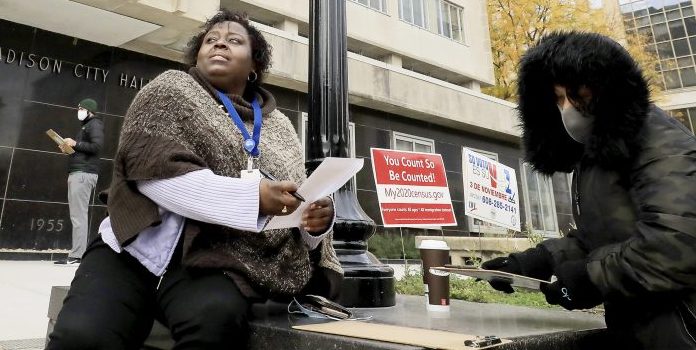(Headline USA) In a major win for election integrity, Wisconsin’s conservative-leaning Supreme Court ruled Friday that absentee-ballot drop boxes may be placed only in election offices and that no one other than the voter can return a ballot in person, dealing a defeat to Democrats who claimed the decision would make it harder to vote in the battleground state.
However, the court didn’t address whether anyone other than the voter can return his or her own ballot by mail. That means that anyone could still collect multiple ballots for voters and, instead of using a drop box, put them in the mail.
Republicans have argued that practice, known as ballot harvesting, is ripe with fraud although there has been no evidence of that happening in Wisconsin. Democrats and others argue that many voters, particularly the elderly and disabled, have difficulty returning their ballots without the assistance of others.
Supporters argue drop boxes are a better option than mailing ballots because they go directly to the clerks and can’t be lost or delayed in transit. Both vote delivery systems are open to the likely potential for vote fraud.
The decision sets absentee ballot rules for the Aug. 9 primary and the fall election; Republican U.S. Sen. Ron Johnson and Democrat Gov. Tony Evers are seeking reelection in key races.
Johnson and other Republicans hailed it as a win for voter integrity.
“This decision is a big step in the right direction,” Johnson said.
Evers and other Democrats said the ruling will make it more difficult for people to vote.
“It’s a slap in the face of democracy itself,” said Democratic Party Chairman Ben Wikler.
The court’s 4-3 ruling also has critical implications in the 2024 presidential race, in which Wisconsin will again be among a handful of battleground states. President Joe Biden allegedly defeated Donald Trump in 2020 by just under 21,000 votes, four years after Trump narrowly won the state by a similar margin.
The popularity of absentee voting exploded during the pandemic in 2020, with more than 40% of all voters casting mail ballots, a record high, much of it necessitated by government lockdowns and other COVID restrictions. At least 500 drop boxes were set up in more than 430 communities for the election that year, including more than a dozen each in Madison and Milwaukee—the state’s two most heavily Democrat cities.
The conservative law firm Wisconsin Institute for Law & Liberty sued in 2021. The state Supreme Court in February barred the use of drop boxes outside election clerk offices in the April election for local offices, such as mayor, city council and school board seats. The court ruled Friday on the question of whether to allow secure ballot boxes in places such as libraries and grocery stores.
State law is silent on drop boxes. The court said the absence of a prohibition in state law does not mean that drop boxes are legal.
“Nothing in the statutory language detailing the procedures by which absentee ballots may be cast mentions drop boxes or anything like them,” Justice Rebecca Bradley wrote for the majority.
The court said absentee ballots can be returned only to the clerk’s office or a designated alternative site but that site cannot be an unstaffed drop box. The bipartisan Wisconsin Elections Commission had told local election officials the boxes can be placed at multiple locations and that ballots can be returned by people other than the voter, but put that on hold pending the Supreme Court’s ruling.
Rick Esenberg, president of the conservative law firm that brought the case, said the ruling “provides substantial clarity on the legal status of absentee ballot drop boxes and ballot harvesting.” He said it also makes clear that state law, not guidance from the Elections Commission, is the final word on how elections are run.
Concerns about the safety of drop boxes expressed by the majority “is downright dangerous to our democracy” Justice Ann Walsh Bradley wrote in dissent.
Republicans who control the Wisconsin Legislature have also tried to enact laws limiting the use of absentee ballots, but Evers has vetoed them.
Republicans have made similar moves since Trump’s defeat to tighten election integrity while not limiting voter access. The restrictions especially target voting methods that have been rising in popularity, pushed by leftists despite the demonstrable flaws of mail balloting and drop boxes.
Bradley was joined in the majority by fellow conservative Justices Patience Roggensack, Brian Hagedorn and Chief Justice Annette Ziegler. In addition to Ann Walsh Bradley, Justices Rebecca Dallet and Jill Karofsky dissented.
Adapted from reporting by the Associated Press

